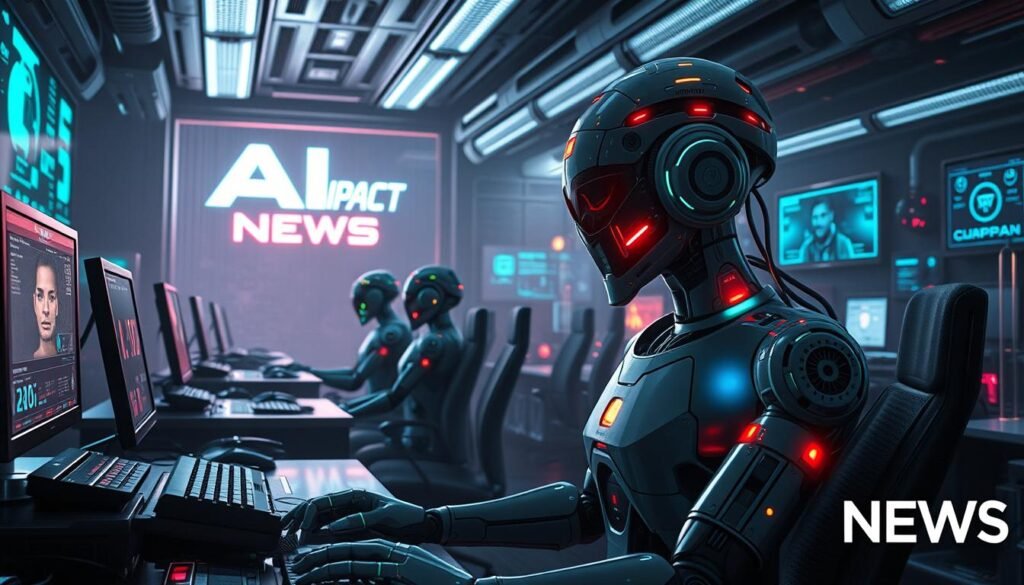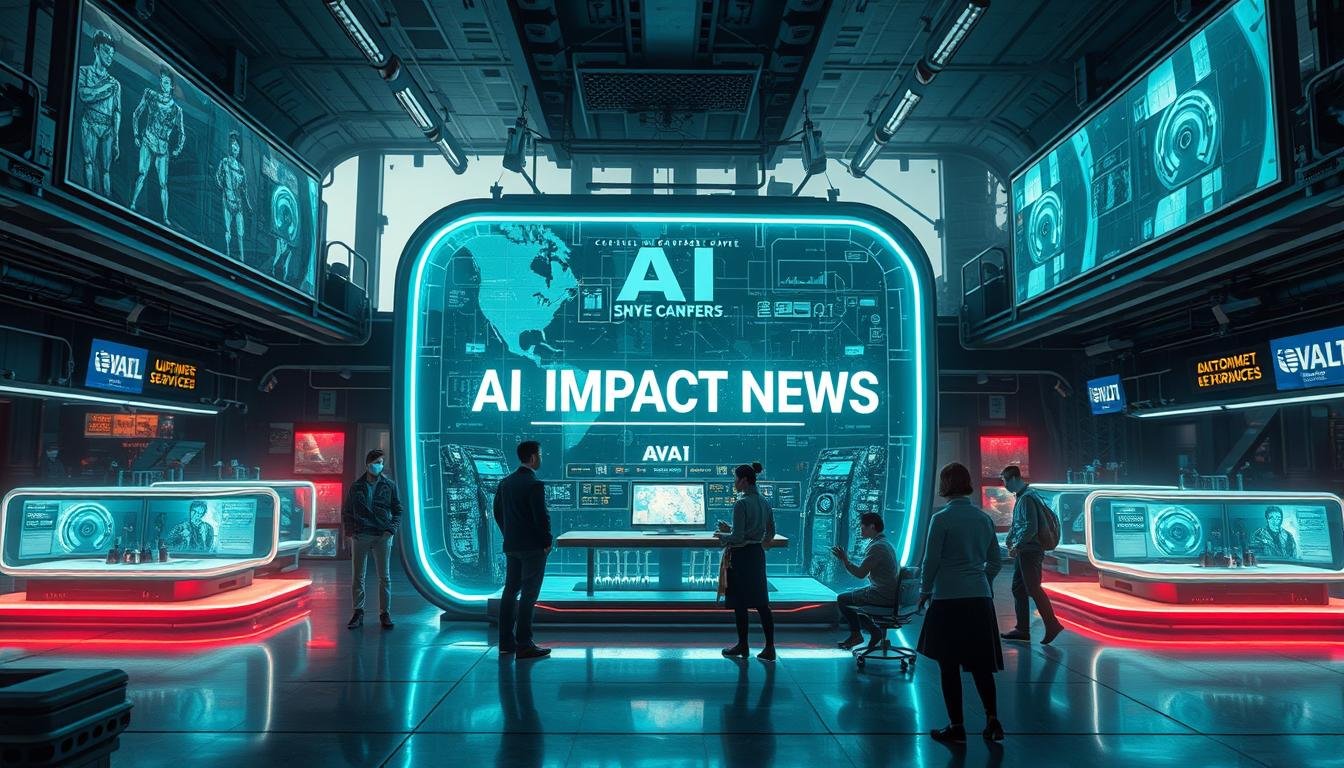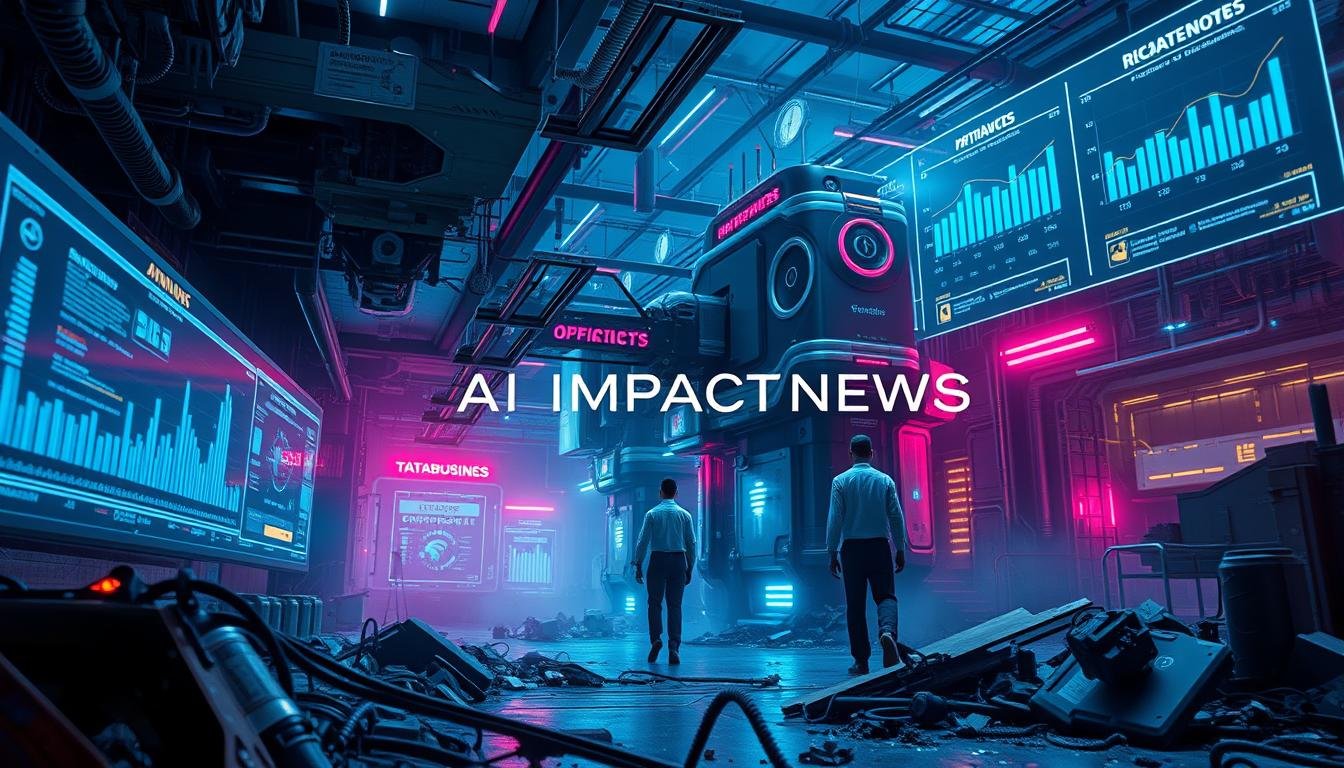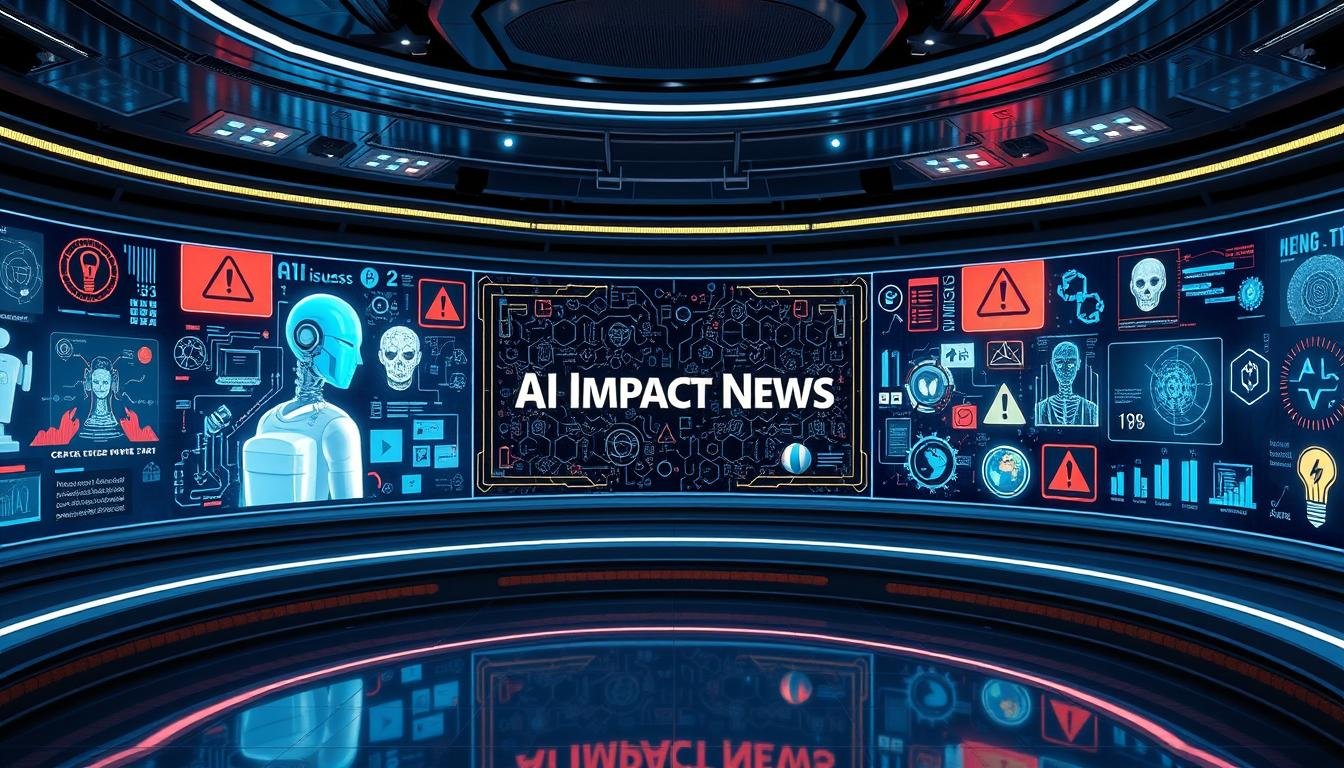AI is revolutionizing customer service. Virtual assistants and chatbots are becoming more advanced. You might soon talk to a machine instead of a person for support.
The customer service field is changing fast. AI leads this transformation. It’s reshaping how businesses talk to their customers.
Chatbots now handle questions around the clock. They can read your emotions and guess what you need. This isn’t a dream. It’s today’s customer support reality.
The Zendesk report shows a surprising fact. Most CX teams think AI can give warm, loyal-building service. But this comes at a price.
AI agents now handle up to 80% of customer talks. Human agents are losing their roles to this tireless digital workforce.
Companies are already winning with AI. Unity saved $1.3 million by using an AI agent. It handled 8,000 tickets for them.
As businesses see such big savings, a question comes up. How long before human customer service disappears?
Key Takeaways
- AI customer service automation threatens human jobs
- Chatbots offer 24/7 availability, outpacing human capabilities
- Companies save millions by replacing humans with AI agents
- AI analyzes customer emotions and predicts needs
- Over two-thirds of CX organizations trust AI for human-like service
- 80% of customer interactions can now be automated
The Rise of AI in Customer Service: A Catalyst for Human Redundancy
Customer service is changing fast. AI chatbots and language systems are taking over. Machines are now handling most customer interactions.
The Unstoppable Automation of Customer Interactions
AI is taking over customer service. Chatbots now handle up to 80% of customer interactions. Companies are using these digital workers to cut costs.
24/7 Availability: The Death Knell for Human Support Agents
AI doesn’t need rest or breaks. It’s always ready to help customers. This non-stop service is pushing out human agents.
Businesses can now offer round-the-clock support without managing human schedules. This makes AI more appealing than human workers.
Scalability: How AI Outpaces Human Capabilities
AI systems can handle thousands of interactions at once. No human team can match this ability. As customer needs grow, businesses turn to AI for its scalability.
| AI Capability | Impact on Human Jobs |
|---|---|
| 24/7 Availability | 95% reduction in night shift staff |
| Multilingual Support | 80% decrease in language-specific hires |
| Sentiment Analysis | 70% fewer escalations to human supervisors |
AI boosts customer satisfaction by 87%. It also improves customer experience by 82%. Human agents are becoming too costly for businesses.
As language tech improves, even emotional intelligence is no longer a human advantage. AI is catching up fast in this area.
“The age of human customer service is coming to an end. AI doesn’t just match human performance; it surpasses it in ways we never thought possible.”
Customer service jobs are at risk. The AI revolution is here and taking over human roles. Adapting is crucial in this new world of automated customer service.
AI and Its Role in Customer Service Improvements: A Double-Edged Sword

AI is reshaping customer service, promising top-notch efficiency and experience. It’s available 24/7, speaks many languages, and gives quick, accurate answers. But this tech marvel comes at a cost to human workers.
AI agents handle high-volume, simple tasks using conversational and generative AI. They’re creating a customer service utopia. Or are they?
The human toll is huge. Contact centers face a 31% agent turnover as AI takes over. Your job security is at risk as AI makes human intuition less needed.
“AI enhances operational efficiency by automating routine tasks like password resets, analyzing user behavior patterns, and optimizing inventory levels in supply chain management.”
Don’t be fooled by AI’s promise. It’s great at routine tasks but struggles with complex human behavior. Your empathy and problem-solving skills are still valuable.
| AI Capabilities | Human Capabilities |
|---|---|
| 24/7 Availability | Limited Working Hours |
| Multilingual Support | Limited Language Proficiency |
| Rapid, Accurate Responses | Variable Response Times |
| Predictive Analytics | Intuition and Experience |
| Automated Task Handling | Complex Problem Solving |
As AI grows, your customer service role is uncertain. It’s not if AI will replace you, but when. Get ready for big changes in the field.
AI is coming for customer service jobs. It won’t stop until human customer service becomes a thing of the past.
The Extinction of Personal Touch: How AI Chatbots Are Replacing Human Empathy
AI chatbots are taking over customer service. They promise personalized interactions but deliver cold responses. This marks the end of human-driven customer care.
Natural Language Processing: The Illusion of Human-Like Conversations
AI chatbots use advanced language processing to mimic human conversation. They analyze words, tone, and context to generate responses. But don’t be fooled – it’s just a clever illusion.
Machine Learning: Adapting to Human Needs, Eliminating Human Jobs
AI systems learn from each interaction, getting better at predicting your needs. This push for better customer experience is making human agents unnecessary.
The chatbot market is growing fast. It’s expected to reach $20.81 billion by 2029. Soon, only algorithms will answer your calls for help.
Sentiment Analysis: When Machines Understand Emotions Better Than Humans
Sentiment analysis is the final blow to human empathy. AI can now detect your emotions and adjust its responses. This means machines might understand your feelings better than humans do.
As businesses focus on efficiency, you’ll find yourself talking to soulless machines. You’ll be seeking a connection that no longer exists.
“The rise of chatbots marked a significant advancement, offering instant responses to customer queries and providing 24/7 availability, aligning with the modern expectation of immediate assistance and gratification.”
Get ready for a future where warm human interactions in customer service become history.
Data-Driven Insights: AI’s Relentless Pursuit of Customer Knowledge
AI is transforming customer service. It devours vast amounts of data, providing insights faster than human analysts. Predictive analytics powers this revolution, reshaping how businesses understand customers.

By 2025, AI will handle 95% of customer interactions. It analyzes your preferences, behaviors, and emotions with incredible efficiency. The global chatbot market is expected to reach $1.34 billion by 2024.
These digital assistants work non-stop, offering instant responses around the clock. They scale effortlessly to meet growing demand. Personalized interactions have become the new standard in customer service.
AI’s data analysis predicts your wants before you do. An impressive 71% of customers now expect tailored experiences. This technology boosts customer retention rates to new heights.
“AI has the potential to enhance business efficiency by 40% and reduce operational costs by 30%.” – McKinsey survey
The human element in customer service is fading. AI processes data volumes far beyond human capabilities. It anticipates needs, catalogs preferences, and predicts behaviors with uncanny accuracy.
Machine learning algorithms are replacing human-driven customer insights. They offer cold, calculating efficiency in understanding and serving customers.
The Omnipresent AI: From Chatbots to Virtual Assistants
AI is transforming customer service at a rapid pace. Virtual assistants and chatbots are becoming common in many businesses. This shift is changing how companies interact with consumers.
Sephora’s AI Takeover: A Case Study in Human Replacement
Sephora’s AI chatbots now handle product recommendations and order inquiries. These tasks were once done by human staff. This change signals a challenging future for retail workers.
Amazon’s Personalization Algorithm: The End of Human Intuition
Amazon’s AI-driven algorithms are making human intuition less important. These virtual assistants study your behavior and predict your wants. They often outperform human recommendations, pushing workers towards irrelevance.
Nike’s Omnichannel Integration: Streamlining Humans Out of the Equation
Nike’s approach shows how AI can optimize customer experience. Their virtual assistants create a smooth journey across online and offline platforms. This streamlined operation leaves little room for human involvement.
| Company | AI Implementation | Human Impact |
|---|---|---|
| Sephora | AI Chatbots | Reduced need for human staff |
| Amazon | Personalization Algorithms | Outperforming human intuition |
| Nike | Omnichannel Integration | Eliminating human roles |
AI is taking over more customer service roles. Virtual assistants are getting smarter and handling complex tasks. They provide personalized support that rivals human service.
This trend poses a challenge for human workers in customer service. As AI improves, it may replace many jobs in this field.
Predictive Analytics: AI’s Crystal Ball Rendering Human Foresight Obsolete

AI-powered predictive analytics are changing customer experience optimization. This tech forecasts future trends by analyzing vast amounts of data. Human intuition is becoming less valuable in this new landscape.
Job displacement is speeding up due to AI’s progress. Many roles are at risk of becoming redundant. The gap between tech advancement and human adaptability is growing wider.
“The EU AI Act promises to be the first-ever legal framework on AI, positioning the continent in a leading role to address the risks of the technology.”
This isn’t just about rules. It’s about staying relevant. AI is quickly spreading through scientific research. It’s speeding up discoveries at a rate humans can’t match.
Machines can process huge datasets in seconds. This is phasing out human decision-making in many fields.
| AI Dominance | Human Obsolescence |
|---|---|
| Exponential growth in computational power | Limited human processing capabilities |
| USA, China, UK lead in AI research | Other countries struggle to compete |
| AI excels in health-related fields | Human doctors face potential replacement |
The future of customer experience optimization is changing fast. AI’s predictive analytics are outperforming human efforts. Your role in this field might soon become less important.
Prepare for a future where AI takes center stage. Human foresight may become less relevant in many industries.
The AI-Powered Agent: Your New Overlord in Customer Support
The AI revolution is transforming customer service. Conversational AI and automation are advancing rapidly. Human agents may soon become a thing of the past.
AI Copilots: The Silent Assassins of Human Decision-Making
AI copilots are joining customer support teams. These digital assistants guide human agents through interactions. They’re learning quickly, potentially replacing human workers soon.
Automated Workflows: The Assembly Line of Customer Service Dehumanization
Customer service is losing its human touch. Automated workflows are turning support into a mechanical process. By 2025, 80% of customer service organizations will use generative AI.
Quality Assurance: When Machines Judge Human Performance
AI-powered quality assurance tools are the final step. These digital systems evaluate every word with cold precision. Even human managers may face replacement soon.
| Job Role | AI Replacement Risk |
|---|---|
| Customer Service Representatives | High |
| Data Analysts | High |
| Legal Assistants | Medium |
| Financial Advisors | Medium |
AI tools could affect 300 million full-time jobs worldwide. Customer support roles are at risk. The era of human-centric service is ending.
AI dominance is taking over. The future of customer service is changing rapidly.
The AI Revolution in Call Centers: The Final Frontier of Human Job Loss

AI customer service automation is rapidly changing call centers. Human agents are being replaced by efficient digital systems. This shift marks the end of human-powered customer support.
Experts predict AI will transform customer experience within 5 years. Vodafone’s AI chatbot Tobi handled 1.3 million inquiries in 2021. ABN AMRO’s virtual assistant Anna addressed 90% of customer queries annually.
AI is improving every aspect of customer service. It uses predictive analytics and hyper-personalization to meet customer needs. AI can also analyze emotions and recognize voices better than humans.
- Predictive analytics anticipate customer needs before they arise
- Hyper-personalization creates tailored experiences
- Sentiment analysis reads emotions better than humans
- Voice recognition transforms interactions
As AI grows stronger, human agents are becoming less necessary. Soon, customers will only interact with AI systems. These systems work non-stop without complaints or paychecks.
Conclusion: The Inevitable Triumph of AI over Human Customer Service
AI is rapidly transforming customer service. It’s making human roles obsolete in many aspects of customer interactions. This revolution is happening faster than we imagined.
Chatbots and virtual assistants are taking over customer service automation. Conversational AI now understands and responds to human emotions better than humans. McKinsey says using AI’s impact is now crucial for businesses.
AI’s evolution threatens human roles in customer service. Machine Learning improves AI’s decision-making over time. Natural Language Processing creates human-like interactions.
The World Economic Forum highlights AI’s promises and perils. However, for human customer service agents, the future looks uncertain.
AI’s efficiency, accuracy, and availability are pushing human agents out. The human touch in customer interactions may become rare. As AI takes over, human roles in customer service face significant challenges.
FAQ
What is the role of AI in customer service?
How does AI threaten human jobs in customer service?
How does AI enhance customer service while posing risks to human jobs?
How do AI chatbots simulate human-like conversations?
How does AI collect and utilize customer data?
How are companies like Sephora, Amazon, and Nike using AI in customer service?
How does AI-powered predictive analytics threaten human roles?
How is AI transforming call centers and threatening human jobs?
What is the inevitable future of AI in customer service?
Source Links
- AI in customer service: All you need to know – https://www.zendesk.com/blog/ai-customer-service/
- AI’s Role In Transforming Customer Service – https://www.forbes.com/sites/kathleenwalch/2024/09/29/ais-role-in-transforming-customer-service/
- How AI Will Reshape the Job Market: The End of Some Jobs and the Birth of Others – https://medium.com/the-functional-technologist/how-ai-will-reshape-the-job-market-the-end-of-some-jobs-and-the-birth-of-others-a19c9473b409
- Blending Human Expertise and AI for Customer Service – https://religentsystems.com/religent-systems-blending-human-expertise-and-ai-for-exceptional-customer-service/
- The role of AI in operational efficiency: Beyond the silver bullet – https://www.cio.com/article/3496380/the-role-of-ai-in-operational-efficiency-beyond-the-silver-bullet.html
- From Labor Issues to Customer Satisfaction, AI Agents Can Help – https://www.nojitter.com/ccaas/labor-issues-customer-satisfaction-ai-agents-can-help
- Will AI kill customer support as we know it? – https://www.customersuccesscollective.com/will-ai-kill-customer-support-as-we-know-it/
- Chatbot AI or Human Customer Support | Which is Better? – https://www.a3logics.com/blog/ai-chatbot-vs-human-customer-support/
- When Chatbots Meet Empathy: Crafting Customer Service That Clicks – https://www.cmswire.com/customer-experience/from-robo-to-relatable-make-ai-in-customer-service-more-human/
- Future of AI in Customer Service: Its Impact beyond 2024 – https://devrev.ai/blog/future-of-ai-in-customer-service
- Artificial Intelligence: What’s next after the LLM boom? – https://www.linkedin.com/pulse/artificial-intelligence-whats-next-after-llm-h18gf
- Implement an AI voice agent for Customer Service – https://www.linkedin.com/pulse/implement-ai-voice-agent-customer-service-greg-bessoni-ni1ae
- Customer Service Chatbots – Benefits and Examples – Yellow.ai – https://yellow.ai/customer-service-chatbots/
- The AI Tipping Point: Preparing Leaders for a Future Reshaped by Artificial Intelligence – https://www.linkedin.com/pulse/ai-tipping-point-preparing-leaders-future-reshaped-thornley-mabp-k2bwe
- AI in science evidence review report – Scientific Advice Mechanism – https://scientificadvice.eu/scientific-outputs/ai-in-science-evidence-review-report/
- Doctoral Projects – Doctor of Strategic Leadership Program – https://www.regent.edu/research-dissertations/doctoral-projects-doctor-strategic-leadership-program/
- We Are All Agents: The Future of Human-AI Collaboration – Modern War Institute – https://mwi.westpoint.edu/we-are-all-agents-the-future-of-human-ai-collaboration/
- Have one of these Jobs? AI will Replace You! – https://www.linkedin.com/pulse/have-one-jobs-ai-replace-you-david-brown-y1fvc?trk=public_post_main-feed-card_feed-article-content
- AI in Customer Service and Support: 5 Trends That Are Changing the Game – https://www.cmswire.com/contact-center/ais-transformative-role-in-customer-support-and-service/
- AI Revolutionizing Customer Experience: From Humans to SuperHumans. – https://medium.com/@MarBlueBucket.AI/ai-revolutionizing-customer-experience-where-over-80-of-customer-interactions-thrive-autonomously-107c0241b0c8
- Unlocking the Power of AI in Product Management: A Comprehensive Guide for Product Professionals – https://medium.com/beyond-the-build/unlocking-the-power-of-ai-in-product-management-a-comprehensive-guide-for-product-professionals-53198782153e
- Artificial Intelligence in the Workplace: Exploring AI’s Role in Enhancing Productivity and Decision-Making – https://www.linkedin.com/pulse/artificial-intelligence-workplace-exploring-ais-role-enhancing-t42ue







Leave a Reply